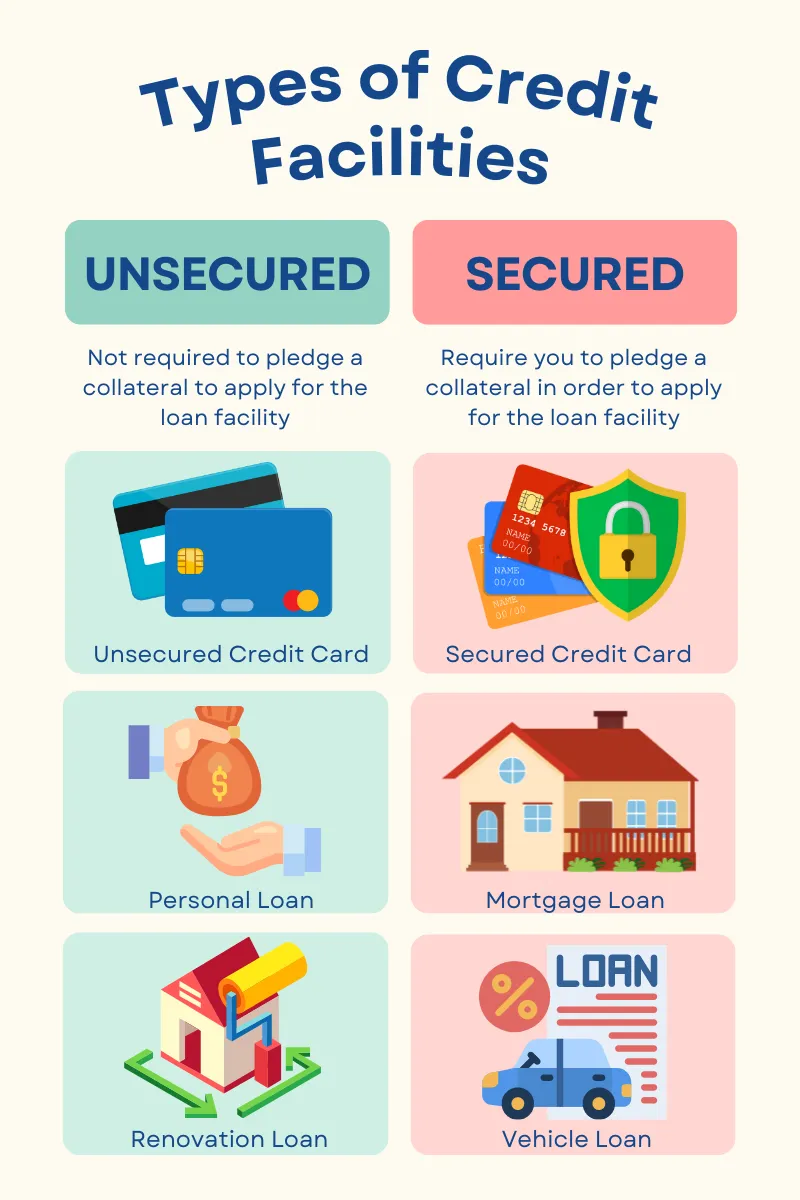What are the different types of credit facilities available?
The credit facilities offered in Singapore can be broadly classified into unsecured lending and secured lending.

Unsecured credit facilities are Unsecured Credit Cards, Overdrafts and Personal Loans. Banks and Financial Institutions (FIs), also known as lenders, will consider certain factors such as the borrower’s risk profile and annual income before they decide on the maximum loan to disburse or the maximum credit limit to assign.
This means that the individual is only able to use up to the credit limit he was given, and the available credit limit will decrease as new purchases are transacted into his credit facility.
Secured credit facilities will usually require the applicant to pledge collateral in order to take up the credit facility. Some of the common examples are mortgages, fixed deposits and vehicle loans. These loans are usually disbursed in a lump sum and repaid in fixed monthly instalments over a period of time.
These credit facilities often come with penalty charges such as late fees or interest fees if the individual fails to pay the outstanding amount before the payment due date.
Common credit traps to avoid
Credit is a good way to help build your credit reputation on your credit report – given that you always repay your bills on time and in full. It can also help you manage your finances if you are planning to make an important big-ticket purchase such as insurance bills, wedding ceremony or home renovations. Some lenders even offer attractive perks and promotions that can help you save money instead of paying for the full priced items. However, be wary of the downside of credit so you do not unknowingly fall deep into debt:
- Charging all your payments to Instalment Payment Plans (IPP). IPPs might give you a false perception that you can easily repay back your bills and lead to impulsive buying. It is important to be practical and to spend only what you can afford so you do not end up buying things that you do not need.
- Paying the minimum due amount only. Some lenders allow consumers to make only a minimum repayment. However, this means your outstanding balances will accumulate together with high interest charges. Making only the minimum payment will have a detrimental effect on your credit score and have a long-term negative impact as you struggle to pay off your outstanding bills on top of the high interest charges.
- Overlooking the terms and conditions. Take a moment to read through the terms and conditions before you sign yourself up for any new credit facility. Be well versed on the penalty charges and interest-free repayment periods so you can have a smoother debt repayment journey. For example, if you are planning to refinance your housing loan, always check your lock-in period expiry date. Some home loans that are beyond the lock-in period will tend to have a spike or surge in interest rates.
- Using beyond your credit limit. Some banks or credit card issuers allow you to spend beyond your assigned credit limit with an over limit fee. You should be mindful of the repercussions if you have a habit of maxing out your credit limit, especially if you are unable to pay back the full amount on time. However, some banks might grant you special credit limit increases if you need to make a large transaction urgently. Alternatively, you can also request your bank to lower your credit limit if you have a tendency to overspend on your credit lines.
Borrow responsibly
Borrowing beyond your means can leave you struggling financially as you go further into debt. Consider all the other existing loans that you have and understand your financial standing before applying for additional loans. Do not borrow for the sake of repaying another debt as you may risk falling into multiple, bigger debts that are even more difficult to repay.
It is also important to do ample research and clear any doubts with the lenders before you agree to take up any new credit/loan facilities.
Lastly, where can I get a copy of my credit report?
To check your credit score, you can purchase a copy of your credit report here or view a sample credit report with detailed explanations. More useful content and tips on maintaining a good credit reputation can also be found here.
This article is contributed by Credit Bureau Singapore.















